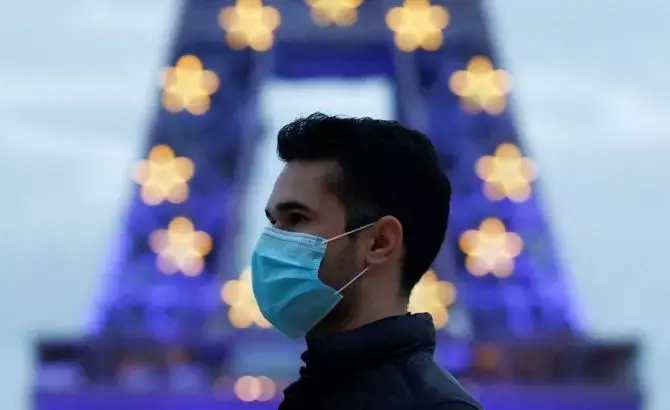- Home
- Medical news & Guidelines
- Anesthesiology
- Cardiology and CTVS
- Critical Care
- Dentistry
- Dermatology
- Diabetes and Endocrinology
- ENT
- Gastroenterology
- Medicine
- Nephrology
- Neurology
- Obstretics-Gynaecology
- Oncology
- Ophthalmology
- Orthopaedics
- Pediatrics-Neonatology
- Psychiatry
- Pulmonology
- Radiology
- Surgery
- Urology
- Laboratory Medicine
- Diet
- Nursing
- Paramedical
- Physiotherapy
- Health news
- Fact Check
- Bone Health Fact Check
- Brain Health Fact Check
- Cancer Related Fact Check
- Child Care Fact Check
- Dental and oral health fact check
- Diabetes and metabolic health fact check
- Diet and Nutrition Fact Check
- Eye and ENT Care Fact Check
- Fitness fact check
- Gut health fact check
- Heart health fact check
- Kidney health fact check
- Medical education fact check
- Men's health fact check
- Respiratory fact check
- Skin and hair care fact check
- Vaccine and Immunization fact check
- Women's health fact check
- AYUSH
- State News
- Andaman and Nicobar Islands
- Andhra Pradesh
- Arunachal Pradesh
- Assam
- Bihar
- Chandigarh
- Chattisgarh
- Dadra and Nagar Haveli
- Daman and Diu
- Delhi
- Goa
- Gujarat
- Haryana
- Himachal Pradesh
- Jammu & Kashmir
- Jharkhand
- Karnataka
- Kerala
- Ladakh
- Lakshadweep
- Madhya Pradesh
- Maharashtra
- Manipur
- Meghalaya
- Mizoram
- Nagaland
- Odisha
- Puducherry
- Punjab
- Rajasthan
- Sikkim
- Tamil Nadu
- Telangana
- Tripura
- Uttar Pradesh
- Uttrakhand
- West Bengal
- Medical Education
- Industry
SARS-CoV-2 variant named 'IHU' emerges in France

Image Source: Rediff Mail
Marseille: A new type of combination variant B.1.640.2, has been discovered in Southeastern France in twelve individuals samples, according to the research paper which has been published in MedRxiv on December 10 2021. The research paper has not been published in an academic journal and yet to be evaluated for the same.
The new variant is called 'IHU' in reference to the institute 'IHU Mediterranee Infection', where it was discovered. It has 46 mutations while Omicron or B.1.1.529 is known to have 50 mutations and delta variant or B.1.617.2 genome with 13 mutations.
The presence of mutations E484K in IHU variant (which is not seen in both Delta and Omicron) is what makes the researcher believe it more resistant to existing vaccines and infectious than the original virus. However, on a more positive note, the new strain does not give off impression of being spreading quickly. Also, a growing body of research demonstrates that it is doubtful to trigger severe disease.
Researchers performed reverse transcription PCR (qPCR) on the first identified case sample who had a travel history in Cameroon and vaccinated against SARS-CoV-2. They detected three mutations of L452R-negativity, E484K-positivity, and E484Q-negativity that did not correspond to the pattern of the Delta variant (L452R-positive) and Omicron (L452R-negative and negative for S gene detection). This atypical combination makes the new variant different from pre-identified ones.
The researchers further performed analysis of viral genomes that revealed the presence of fourteen amino acid substitutions, including N501Y and E484K, and 9 deletions are located in the spike protein. Another respiratory samples collected from eleven other SARS-CoV-2-positive patients living in the same geographical area were then analyzed until end of November 2021. All these results exhibited the same combination of mutations screened by qPCR in the previous case.
"These data are another example of the unpredictability of the emergence of SARS-CoV-2 variants, and of their introduction in a given geographical area from abroad.' the researchers say in their paper.
Reference: Emergence in Southern France of a new SARS-CoV-2 variant of probably Cameroonian origin harbouring both substitutions N501Y and E484K in the spike protein. doi.org/10.1101/2021.12.24.21268174
Medical Content Writer at Medical Dialogues. Kimi holds an MSc in Forensic Science from the University of Delhi.
Dr Kamal Kant Kohli-MBBS, DTCD- a chest specialist with more than 30 years of practice and a flair for writing clinical articles, Dr Kamal Kant Kohli joined Medical Dialogues as a Chief Editor of Medical News. Besides writing articles, as an editor, he proofreads and verifies all the medical content published on Medical Dialogues including those coming from journals, studies,medical conferences,guidelines etc. Email: drkohli@medicaldialogues.in. Contact no. 011-43720751


